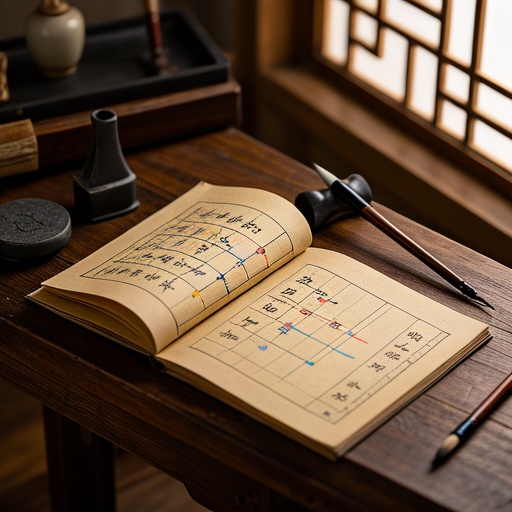Earthly Branches: Punishment, Clash, Break, Harm
3/15/2025, 8:29:04 PM
In the Eight Characters of Birth Destiny (Bazi) theory, there are complex and subtle relationships among the Earthly Branches, and these relationships have an important impact on a person's fate. Among them, the punishment, clash, break, and harm of the Earthly Branches are the parts that need to be focused on. Now let's take a detailed look at various relationships such as the punishment, clash, break, and harm of the Earthly Branches.
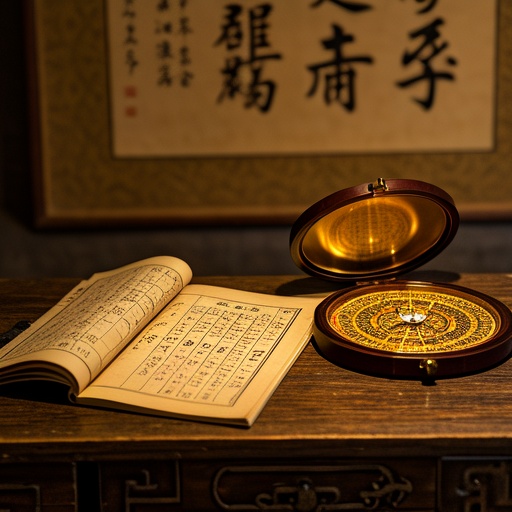
Earthly Branches Six Combinations (Harmonious Combinations)
The Six Combinations of Earthly Branches refer to the pairwise harmonious relationships between the Earthly Branches, specifically Zi-Chou combination, Yin-Hai combination, Mao-Xu combination, Chen-You combination, Si-Shen combination, and Wu-Wei combination. This kind of harmonious relationship is like a friendly and harmonious cooperative relationship established between two people.
For example, in the Zi-Chou combination, Zi belongs to water and Chou belongs to earth. Seemingly, water and earth are in a mutually restraining relationship, but here they can combine. From the perspective of the Five Elements, there is the remaining qi of water in Chou earth, and Zi water can also moisten Chou earth, and the two blend with each other. In the Eight Characters, if the Zi-Chou combination appears, it often represents a harmonious interpersonal relationship or a cooperation opportunity. For instance, in career, one may meet like-minded partners to jointly promote the development of the career.
The same goes for the Yin-Hai combination. Yin is wood and Hai is water. Water generates wood, and the two have a mutually generating relationship. This combination may have a positive impact on feelings. For example, it is easy to meet a partner who is in harmony with oneself.
Here is the specific table of the Six Combinations of Earthly Branches 📊:
| Six Combination Pairs | Five-Element Attributes |
|---|---|
| Zi-Chou combination | Water and Earth |
| Yin-Hai combination | Wood and Water |
| Mao-Xu combination | Wood and Earth |
| Chen-You combination | Earth and Metal |
| Si-Shen combination | Fire and Metal |
| Wu-Wei combination | Fire and Earth |
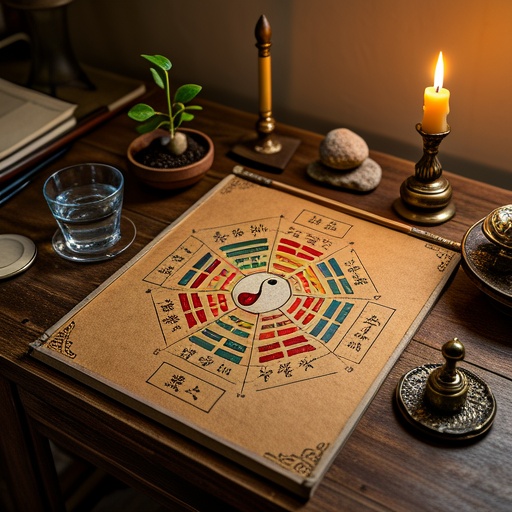
Three Combinations of Earthly Branches (Forming the Five Elements)
The three combinations of earthly branches refer to the combination of three earthly branches to form a powerful force of the five elements. Specifically, they include Shen-Zi-Chen combining to form water, Hai-Mao-Wei combining to form wood, Yin-Wu-Xu combining to form fire, and Si-You-Chou combining to form metal.
Taking Shen-Zi-Chen combining to form water as an example, Shen is the place where water is born, Zi is the place where water is at its peak, and Chen is the place where water is stored. When these three earthly branches are combined, they form a powerful force of water. In the Eight Characters, if the Shen-Zi-Chen water combination appears, the power of the water element will be greatly enhanced. This powerful force of the five elements will have a significant impact on a person's character and fate. For example, water represents wisdom, so the person may be relatively intelligent, flexible, and have a quick mind.
For Hai-Mao-Wei combining to form wood, Hai is the place where wood is born, Mao is the place where wood is at its peak, and Wei is the place where wood is stored. Wood represents benevolence, so the person may be relatively kind, compassionate, and have a sympathetic heart.
Here is a table of the three combinations of earthly branches 📊:
| Three Combinations | Formed Five Elements |
|---|---|
| Shen-Zi-Chen | Water |
| Hai-Mao-Wei | Wood |
| Yin-Wu-Xu | Fire |
| Si-You-Chou | Metal |
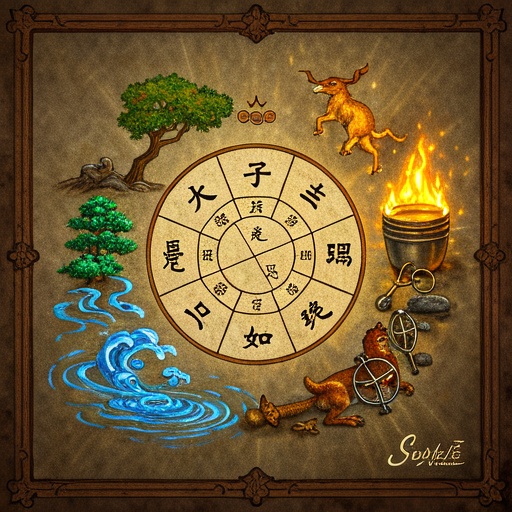
Three Punishments among the Earthly Branches (Mutual Punishment and Restraint)
The three punishments among the earthly branches refer to the relationships of mutual punishment and restraint between the earthly branches, mainly including the punishments of Yin, Si, and Shen; the punishments of Chou, Wei, and Xu; and the punishment of Zi and Mao (the Punishment of Ingratitude).
The Punishments of Yin, Si, and Shen
Yin represents wood, Si represents fire, and Shen represents metal. Wood generates fire, fire restrains metal, and metal restrains wood. A complex relationship of punishment and restraint is formed among the three. In the Eight Characters, if the punishments of Yin, Si, and Shen appear, it may represent disharmony in interpersonal relationships, and it is easy to have conflicts and contradictions with others. For example, at work, there may be frictions with colleagues and superiors, which affects the progress of work.
The Punishments of Chou, Wei, and Xu
Chou, Wei, and Xu all belong to earth. The punishment and restraint among them are more of an internal contradiction and conflict. When this kind of punishment and restraint appears in the Eight Characters, it may have an impact on family relationships. For example, family members are prone to quarrels and disharmony. Moreover, in terms of health, it may also affect the spleen and stomach and other organs related to earth. Shenshu fortune - tellers will pay special attention to the situation of the punishments of Chou, Wei, and Xu when analyzing the Eight Characters to infer the family and health fortune of the person whose eight - characters are being analyzed.
The Punishment of Zi and Mao (the Punishment of Ingratitude)
Zi belongs to water and Mao belongs to wood. Water generates wood, but here a relationship of punishment and restraint is formed, which is called the Punishment of Ingratitude. This kind of punishment and restraint may be reflected in the emotional aspect. For example, in a romantic relationship, there are prone to situations such as betrayal and harm. It may also affect personal emotions, leading to emotional instability.
Here is a table of the three punishments among the earthly branches 📊:
| Combinations of the Three Punishments | Five - Element Attributes |
|---|---|
| Yin, Si, Shen | Wood, Fire, Metal |
| Chou, Wei, Xu | Earth |
| Zi, Mao | Water, Wood |
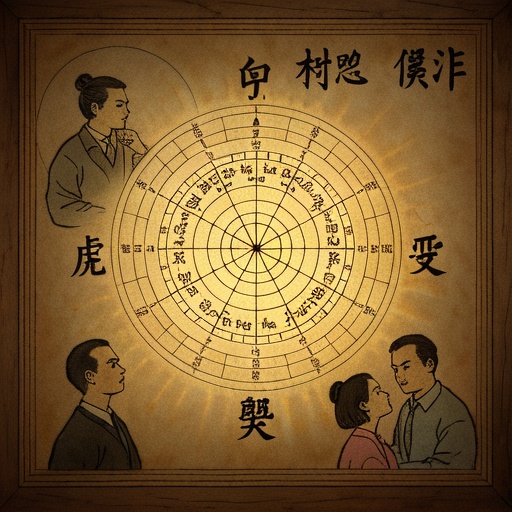
Six Conflicts of Earthly Branches (Direct Conflicts)
The six conflicts of earthly branches refer to the direct conflict relationships between the earthly branches, including the conflict between Zi and Wu, Chou and Wei, Yin and Shen, Mao and You, Chen and Xu, and Si and Hai.
Taking the conflict between Zi and Wu as an example, Zi belongs to water and Wu belongs to fire. Water restrains fire, so they are in a direct opposing relationship. When the conflict between Zi and Wu appears in the eight - character horoscope, it may represent significant ups and downs and changes in life. For example, in one's career, one may face sudden setbacks or opportunities and needs to constantly adjust one's state to cope.
The conflict between Chou and Wei is also a relatively common six - conflict relationship. Both Chou and Wei belong to earth, but their natures are different. Chou is moist earth and Wei is dry earth. This kind of conflict may affect an individual's financial fortune. For example, there are likely to be financial fluctuations, or mistakes are prone to occur in financial management. The fortune analysis function of Shenshu's eight - character horoscope can help us more accurately analyze the impact of the six - conflict relationships in the eight - character horoscope on one's fortune.
Here is a table of the six conflicts of earthly branches 📊:
| Six - conflict Combinations | Five - element Attributes |
|---|---|
| Conflict between Zi and Wu | Water and Fire |
| Conflict between Chou and Wei | Earth and Earth |
| Conflict between Yin and Shen | Wood and Metal |
| Conflict between Mao and You | Wood and Metal |
| Conflict between Chen and Xu | Earth and Earth |
| Conflict between Si and Hai | Fire and Water |
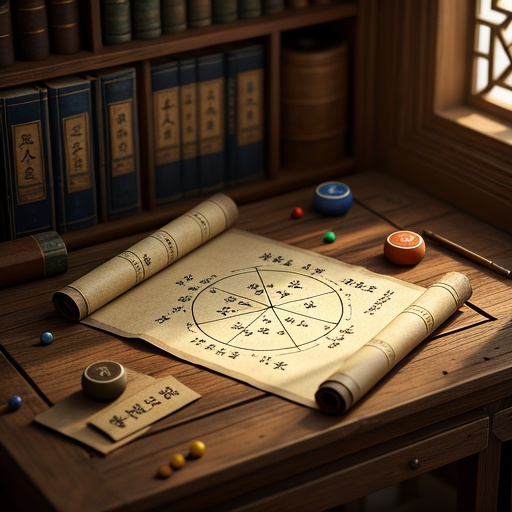
Earthly Branches Breaking (Conflicts with Lesser Influence)
Earthly Branches Breaking refers to a conflict relationship with relatively less influence, such as Yin breaking Si, Si breaking Shen, Shen breaking Yin, Hai breaking Shen, Wu breaking Mao, and Wei breaking Xu.
Taking Wei breaking Xu as an example, both Wei and Xu belong to the Earth element, but Wei breaking Xu will cause a certain degree of damage to the Five - Element power of Earth. Although this kind of damage is not as intense as the Six - Clashes, it will also affect an individual's fortune to a certain extent. For example, in interpersonal relationships, there may be some minor contradictions and frictions, but it won't lead to intense conflicts like the Six - Clashes.
In the theory of the Eight Characters in Chinese fortune - telling, relationships such as punishment, breaking, and harm among the Earthly Branches are inter - related and mutually influential. We cannot judge a person's fate based on just one kind of relationship. Instead, we need to comprehensively consider various factors in the Eight Characters. The free Bazi Compatibility function of Shenshu will also fully consider these relationships of the Earthly Branches when analyzing the Eight Characters of two people to determine whether their marriage is harmonious.
In short, the relationships of punishment, breaking, and harm among the Earthly Branches are a very important part of the theory of the Eight Characters in Chinese fortune - telling. A deep understanding of these relationships is of great significance for us to accurately grasp our own fate. These relationships may have a certain impact on various aspects such as career, relationships, and health. We can learn the knowledge of the theory of the Eight Characters to better understand ourselves and make wiser decisions in life.
